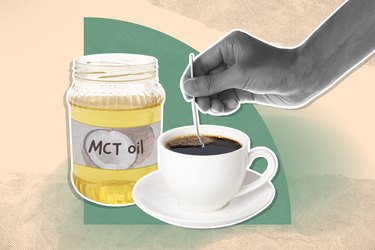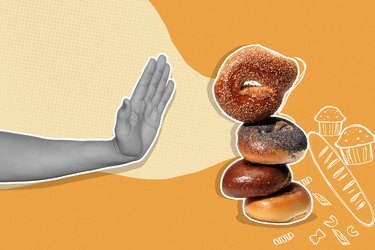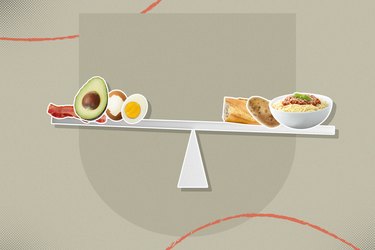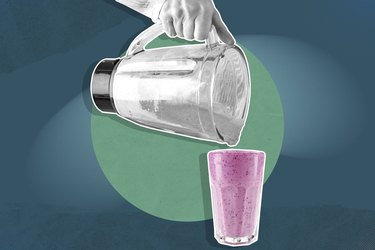
We get it if coffee's your main motivation for getting out of bed in the morning. While many of us share a passion for java, how we take our coffee can look completely different. Some like it straight up; others swear by syrups; there are those who require creamer. And still, some believe in the powers of Bulletproof coffee.
Below, registered dietitians explain everything you need to know about Bulletproof coffee, including what it is and whether you should make it a part of your mornings.
Video of the Day
Video of the Day
Related Reading
What Is Bulletproof Coffee?
Popularized by Bulletproof Diet creator Dave Asprey in 2011, Bulletproof coffee is made from brewed coffee, grass-fed butter or ghee and medium chain triglyceride (MCT) oil that all get blended together to create a keto-friendly beverage.
Because the Bulletproof eating pattern fuses intermittent fasting with the ketogenic diet, its backbone, Bulletproof coffee, is meant to replace a morning meal.
According to the Bulletproof website, the buzzy beverage's key ingredients — a specific MCT oil called Brain Octane C8 MCT Oil ($26.95 for 16 ounces, Amazon.com) and either grass-fed butter or ghee — are its secret sauce. Why? "MCT oils are easily digested and absorbed due to their unique chemical structure," explains Anya Rosen, RD, registered dietitian and founder of the Birchwell Clinic.
Allow us to explain: The fats found in our food can be made up of short, medium and long-chains of fatty acids. Long-chain fatty acids are, not surprisingly, larger. As a result, they undergo a number of steps during digestion, including getting broken down, repackaged and then transported through the lymphatic system before hitting our bloodstream.
The body handles medium-chain triglycerides differently. "MCTs are able to travel directly to the liver, which fast-tracks the body's ability to utilize them for energy," Rosen says.
On the low-carb Bulletproof Diet, MCTs may be converted into ketones, which can act as a source of quick fuel for the brain (instead of carbohydrates). The body's unique metabolism of MCTs is why Asprey and others claim Bulletproof coffee delivers "more brain power and sustained energy" to those who drink it.
Why the inclusion of grass-fed butter or ghee in the Bulletproof coffee recipe? These additional fats are meant to make Bulletproof coffee extra filling, provide a rich mouthfeel and serve up some nutrients.
In addition to being higher in omega-3s, grass-fed "yellow butter has a higher vitamin A content, while ghee has less lactose and casein," explains Wendy Bazilian, RD, DrPH, registered dietitian and author of the Eat Clean, Stay Lean series.
More on MCTs
There’s nothing new about MCTs. The easy-to-digest lipids have long been given to people who lack the necessary enzymes to absorb dietary fats. People who are missing part of their small intestine, for example, may be given supplemental MCTs to prevent fat malabsorption. “It has also traditionally been used in medical care to manage epilepsy in children [who are following] therapeutic ketogenic diets,” Rosen says.
MCTs can also cause GI symptoms including stomach pain, nausea, vomiting and diarrhea, according to the Cleveland Clinic, so start with a small amount and build up to more as desired.
Bulletproof Coffee Nutritional Information
According to the Bulletproof website, 1 cup of Bulletproof coffee contains:
- Calories: 230
- Total fat: 25 g
- Saturated fat: 21 g
- Carbohydrates: 0 g
- Fiber: 0 g
- Protein: 0 g
Tip
Keep in mind calories and fat will vary depending on how much oil and butter or ghee you use.
Benefits of Bulletproof Coffee
1. It Could Blunt a Caffeine Crash
If you're accustomed to strict intermittent fasting, adding a cup of Bulletproof coffee to your morning may not be the worst idea.
"One benefit of Bulletproof coffee in the morning compared to only black coffee is its fat can help slow down the body's absorption of caffeine," Rosen says. "This can help blunt the spike and subsequent crash in energy that is often experienced when consuming caffeine on an empty stomach."
2. It Might Curb Your Appetite
Some research suggests MCTs may help you feel fuller longer, Rosen says.
Research on this potential benefit is so far very limited. One very small June 2021 study in Current Developments in Nutrition found healthy young adults reported feeling fuller 3 hours after drinking Bulletproof coffee than after drinking black coffee.
And while not a study of Bulletproof coffee, another very small October 2014 study in the European Journal of Clinical Nutrition reported people given MCT supplements at breakfast ate fewer calories at lunch compared to people who were given a long-chain triglyceride (LCT) supplement at breakfast.
More research is needed to fully understand the effects of MCTs in general and Bulletproof coffee in particular on appetite.
3. It May Promote Weight Loss — Temporarily
People following the Bulletproof Diet are meant to enter a state of ketosis in which the body burns fat instead of carbs for fuel.
A ketogenic-style diet may lead to weight loss for some people, Bazilian says, as well as improvements in insulin resistance and appetite control, according to a May 2021 review in Nutrients.
But keto benefits are often short-lived — and come at a price. Potential side effects of the keto diet include dehydration, electrolyte imbalances, digestive issues like constipation, vitamin and mineral deficiencies and elevated blood cholesterol levels, among others, Bazilian says.
Plus, this eating pattern is highly restrictive. "Restriction works for some people temporarily because it's more clear-cut," Bazilian says. But that all-or-nothing approach isn't likely to last. After all, who wants to replace brunch with Bulletproof coffee for the rest of their life?
Risks of Bulletproof Coffee
1. It Can Spike Your Cholesterol Levels
The number one culprit for high cholesterol levels is saturated fat, and that's what you'll get from Bulletproof coffee.
The American Heart Association recommends no more than 5 to 6 percent of our daily calories come from saturated fat. On a 2,000 calorie-per-day diet, that translates to a goal of just 13 grams of saturated fat daily. For reference, 1 cup of Bulletproof coffee serves up 21 grams of saturated fat (depending on your recipe) — that's more than 1.5 times our recommended allotment for the entire day.
That said, there is also research suggesting not all MCTs (because there are different types, as evidenced by the Bulletproof recipe calling for a specific brand) increase cholesterol, including an October 2021 meta-analysis in The Journal of Nutrition. More research is needed into the effects of MCTs and Bulletproof coffee on cholesterol levels and heart health.
In the meantime, it may be best to err on the side of caution. "Prevailing research for cardiovascular health still favors more polyunsaturated fats and less saturated fats," Bazilian says.
2. It Doesn't Compete With a Balanced Breakfast
"While [Bulletproof coffee] might be satisfying to some, it doesn't take the place of a nutritious meal or snack," Bazilian says.
By replacing a balanced breakfast with a cup of caffeine, we miss out on a key opportunity to incorporate lean protein, quality carbohydrates and nutrients from fruits and vegetables in our diets.
On the flip side, having this high-calorie drink in addition to your usual balanced breakfast can also pose problems.
"We don't often 'count' our beverages in the same way as we count our foods and meals," Bazilian says. "Not everyone can add this 230-calorie beverage to their existing diet without having to make some other changes… It can take up too much space in the diet and run the risk of pushing out other [nutrient-dense] foods."
The Bottom Line
Before jumping on the Bulletproof coffee train, consider how the drink could affect your heart health.
"Consuming an excessive amount of saturated fat can be problematic for individuals at risk for cardiovascular disease," Rosen says. Those at risk of (or already diagnosed with) heart disease should instead emphasize unsaturated fats like those found in nuts, seeds, vegetable oils and avocado.
Bazilian also encourages people to consider questions like: How does this fit into my diet? How often am I going to drink it? Is this choice aligned with my health goals? And, perhaps most importantly, Do I even enjoy this?
So many people try something because they've heard it's good for them but don't actually like it, Bazilian says. Better to identify nutrient-dense foods and flavors you genuinely enjoy. And remember: "One choice like this won't make or break a person… but it's not on the top 10 (or maybe even top 20, 30 or 40) list of what I'd advise as a health-enhancing behavior," Bazilian says.
- European Journal of Clinical Nutrition: "The Effect of Replacing Dietary Saturated Fat With Polyunsaturated or monounsaturated Fat on Plasma Lipids in Free-Living Young Adults"
- American Heart Association: "Saturated Fat"
- European Journal of Clinical Nutrition: “Impact of Medium and Long Chain Triglycerides Consumption on Appetite and Food iIntake in Overweight Men”
- Bulletproof: "Bulletproof Coffee Recipe"
- Current Developments in Nutrition: "Investigating the Effects of a High-fat Coffee Beverage Containing Medium-Chain Triglyceride Oil and Ghee on Cognitive Function and Measures of Satiety"
- Nutrients: "The Potential Health Benefits of the Ketogenic Diet: A Narrative Review"
- Cleveland Clinic: "Is MCT Oil Worth the Hype?"
- The Journal of Nutrition: "Medium-Chain Triglyceride Oil and Blood Lipids: A Systematic Review and Meta-Analysis of Randomized Trials"



